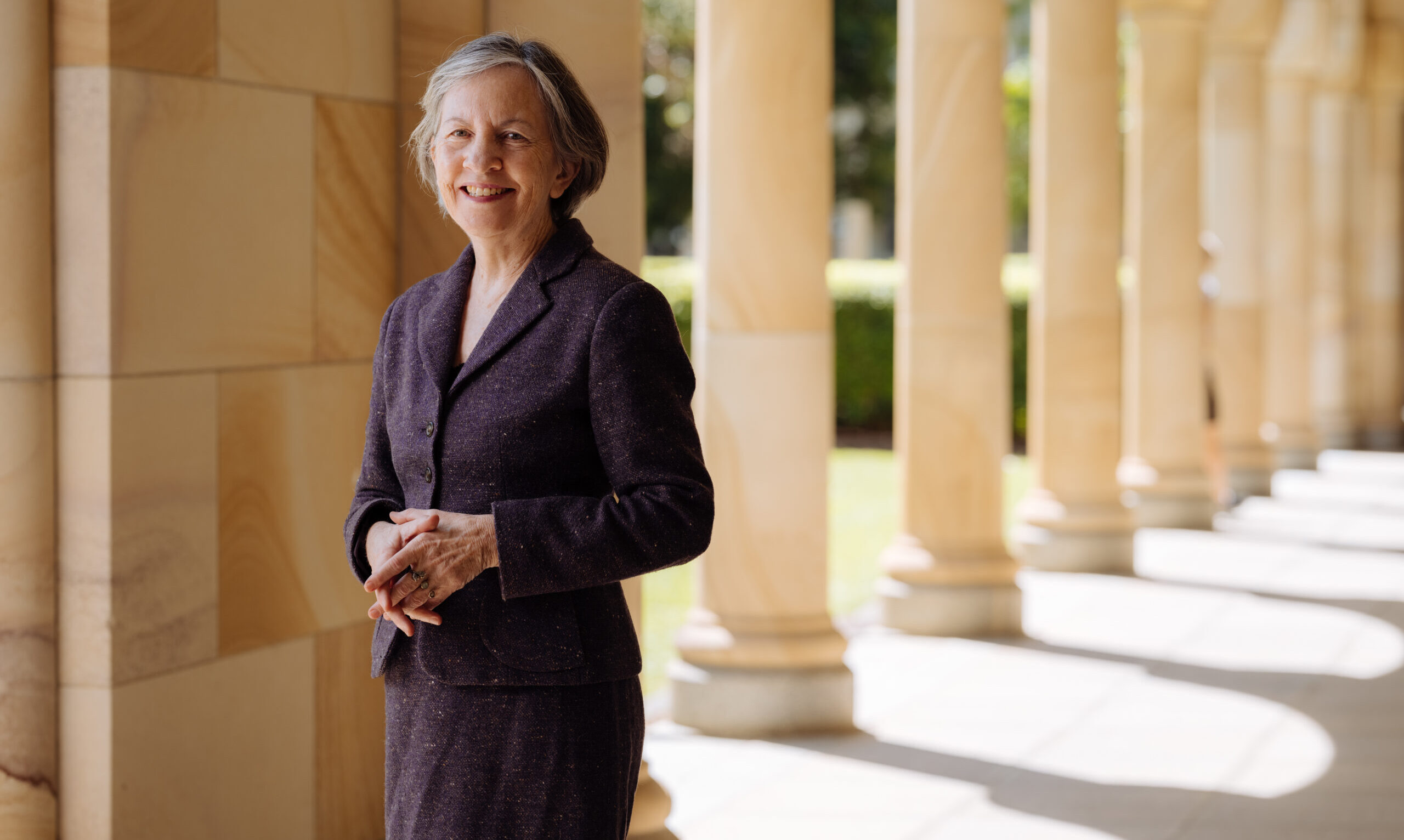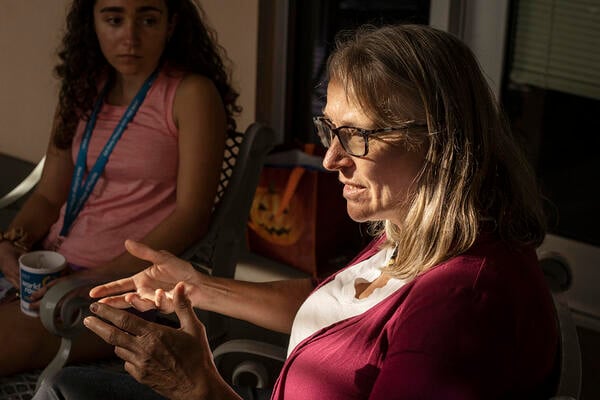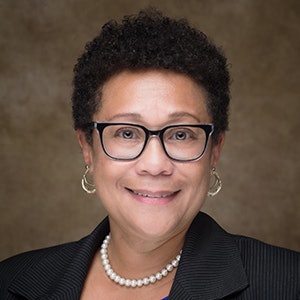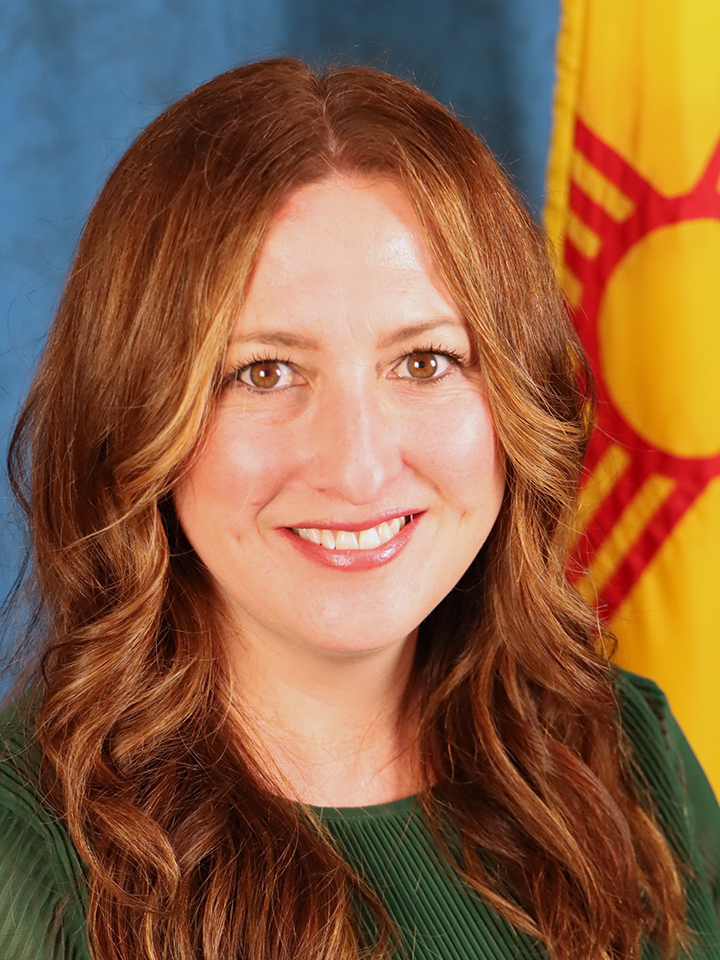The University of Queensland (UQ) has announced Emeritus Professor Mary O’Kane will be its next chancellor, the first female to take up the position.
Please login below to view content or subscribe now.
Membership Login

The University of Queensland (UQ) has announced Emeritus Professor Mary O’Kane will be its next chancellor, the first female to take up the position.
Please login below to view content or subscribe now.

Reid retired in August after 30 years at New College.
Thomas Simonetti/The Washington Post/Getty Images
Amy Reid, a former professor of French at New College of Florida, was granted “honorary alumni” status by the New College Alumni Association Board of Directors in a unanimous vote nearly three weeks after she was denied emerita status by college president Richard Corcoran.
“I was honored when my colleagues nominated me for emerita status and when the New College Alumni Association adopted me as one of their own, in recognition of my long teaching career and my vocal advocacy for the College, its academic program, and for the position of gender studies in the liberal arts,” Reid said in a statement to Inside Higher Ed. “New College students have made their mark because they are fiercely independent and courageous learners. I’ll try to live up to their standards. To the Novo community: Honor & Respect.”
The honorary designation, rarely bestowed, gives Reid the same “rights and privileges” as other New College alumni, including access to alumni events, according to the alumni association’s motion. Reid retired in August after teaching at New College for more than 30 years and now serves as interim director of PEN America’s Freedom to Learn program.
Reid was also the founder of the now-defunct gender studies program at New College, which the then–newly appointed conservative board eliminated in 2023. The college was mired in controversy again the following summer when officials tossed books from its former Gender and Diversity Center in the trash.
Despite what alumni association governance committee chair Chris Van Dyk described as “overwhelming recommendation” for emerita status, including from New College provost David Rohrbacher and leaders in the Division of Humanities, Corcoran denied Reid the emerita title because of her outspoken faculty advocacy and criticism of conservative leadership at New College.
“Although I recognize Professor Reid’s contributions to New College in teaching and scholarship, I cannot concur with the Division and Provost that she be honored with the title of emeritus,” Corcoran wrote in an email to Rohrbacher. “When I became president with a mandate for change from the Board of Trustees, there was need for reasoned and respectful exchange between the faculty and administration. Regrettably, Professor Reid was one of the leading voices of hyperbolic alarmism and needless obstruction. In her letter of resignation, Professor Reid wrote that ‘the New College where I once taught no longer exists.’ She need not be burdened by further association with it.”
After the former faculty representative to the New College Board of Trustees quit in protest, Reid was elected to fill the role in 2023. She and student representative Grace Keenan were the only two board members to vote against Corcoran’s appointment as permanent president, Florida Politics reported.
Emeritus status is largely symbolic, but it does usually come with some concrete perks, including the continued use of institutional email accounts, library and athletic facilities access, and sometimes free campus parking.

Prestigious EdTech Breakthrough award highlights Top Hat’s leadership in delivering flexible, AI-powered courseware to support faculty and students.
TORONTO – June 6, 2025 – Top Hat, the leader in student engagement solutions for higher education, has been named the 2025 Courseware Solution Provider of the Year. The annual EdTech Breakthrough Awards honor organizations that push the boundaries of educational technology—benefiting students, educators, and institutions across North America and around the world. In a global field of over 2,700 nominations, Top Hat stood out for its efforts to empower faculty to create and deliver engaging, connected, and affordable learning experiences for students.
“Receiving this award is an honor and supports our belief that better student outcomes begin with the course itself,” said Maggie Leen, CEO of Top Hat. “We’re proud to support thousands of faculty with tools that make it easier to adopt proven teaching practices, and grateful to our team for the creativity and care they show everyday in making great learning experiences a reality for more students.”
Now in its seventh year, the EdTech Breakthrough Awards have become a benchmark for excellence in educational technology. The program celebrates the industry’s most visionary companies—those dreaming bigger, innovating further, and setting new standards for enhancing the practice of teaching and learning. Top Hat’s selection reflects its track record of building solutions that drive measurable academic outcomes and dramatic improvements in student engagement, inside and outside the classroom.
Top Hat’s courseware platform gives instructors unprecedented flexibility to tailor content to their teaching goals. The platform integrates interactive assessments, multimedia, and AI-powered tools that allow educators to instantly create in-class questions and reflection prompts. This makes it easier than ever for instructors to apply evidence-based practices like active learning and low-stakes assessment. Students also benefit from AI-powered on-demand study support and unlimited practice questions rooted directly in course content.
Top Hat has a long-standing commitment to helping faculty adopt, adapt, or create modern, interactive course materials that improve engagement and comprehension while advancing institutional goals around student affordability and equity. By supporting the use of low- or no-cost learning materials—including customizable OpenStax and OER titles enriched with interactive features—Top Hat empowers educators to design meaningful learning experiences that reflect their unique pedagogical goals while reducing costs for students.
About Top Hat
As the leader in student engagement solutions for higher education, Top Hat enables educators to employ evidence-based teaching practices through interactive content, tools, and activities in in-person, online, and hybrid classroom environments. Thousands of faculty at 900 leading North American colleges and universities use Top Hat to create meaningful, engaging and accessible learning experiences for students before, during, and after class. To learn more, please visit tophat.com.

Smith-Jackson, a human factors engineer who has served as provost and executive vice chancellor for Academic Affairs at NC A&T since 2013, will assume her new role on August 1. Her appointment was approved unanimously by the Rutgers Board of Governors and announced jointly by current President Dr. Jonathan Holloway and President-designate Dr. William F. Tate IV.
“Tonya Smith-Jackson is a person of principles and values who has dedicated her professional life to making transformative changes in higher education,” Holloway said in announcing the appointment.
At NC A&T, the nation’s largest historically Black college and university, Smith-Jackson has overseen remarkable growth and innovation. Under her leadership, the university has launched three new doctoral programs and created the state’s first bachelor’s degree program in artificial intelligence. She has also presided over dramatic increases in both research staff and graduate assistants.
Her tenure at NC A&T has been marked by the establishment of three new Centers of Excellence focused on cybersecurity, product design and manufacturing, and entrepreneurship and innovation. Smith-Jackson also led the university’s successful recognition as an anchor institution by the Association of Public and Land-grant Universities.
Prior to her current role, Smith-Jackson chaired NC A&T’s Department of Industrial and Systems Engineering and directed multiple research initiatives, including a cybersecurity center, the Human Factors Analytics Lab, and the laboratory for Cyber-Human Analytics Research for the Internet of Things.
Smith-Jackson brings a unique blend of academic, corporate, and government experience to her new role. She holds a doctorate in psychology/ergonomics and an interdisciplinary Master of Science degree in psychology and industrial engineering.
Before joining NC A&T, she spent 14 years at Virginia Tech, advancing from assistant professor to full professor of industrial and systems engineering. Her professional experience also includes engineering roles at IBM and Ericsson Mobile Communications, as well as a year-long appointment as program director in the National Science Foundation’s Cyber-Human Systems Program from 2018-2019.
Smith-Jackson said that her approach to higher education leadership is deeply rooted in personal experience and family values.
“Inspired by my parents’ belief in education as a pathway to liberation, meaning and purpose, I’ve dedicated my life to helping others obtain college degrees and upward mobility,” she said.
President-designate Tate said that Smith-Jackson’s background positions her well for the role.
“As an engineer with contributions to human factors research, she brings a systems-oriented, people-centered approach well suited to leading an urban university,” Tate said. “I look forward to partnering with her to expand opportunity pathways, advance impactful research and promote economic development for the region and the state.”

***HEPI and the UPP Foundation will host a free webinar on 4 June at 1pm on service learning, how universities can integrate community service with academic studies. Register for your place here.***
During September 2020, Studiosity launched the Professor Tracey Bretag Prize for Academic Integrity – an annual commitment to those who are advancing the understanding and implementation of academic integrity in the higher education sector, in honour of Tracey’s work as a researcher in the field of educational integrity.
Tracey was one of the world’s leading experts on academic integrity, founding the International Journal for Educational Integrity and serving as Editor-in-Chief of the Handbook of Academic Integrity. She spoke widely and publicly on the importance of universities taking a strong stand on educating their students about academic integrity and enforcing the rules with vigour and strong sanctions.
Tracey also came to work alongside the team at Studiosity, providing advice, guidance, and sharing her research at events. When asked for her permission to create an annual Academic Integrity award named in her honour, this was Tracey’s response:
I am so deeply honoured by your suggestion that I am almost speechless. Thank you so much for coming up with such a fabulous idea, and especially for putting it in my name. … Thank you again for this incredible recognition of my very small contribution to the field of academic integrity. As I work hard every day to try to demonstrate the type of bravery I’ve always advocated, this certainly gives me a great deal of comfort.
Tracey prematurely passed away on 7 October 2020. In February 2021, she was honoured posthumously with a Career Achievement Award from the Australian Awards for University Teaching.
Looking at the Award’s previous entries, we can see a clear shift in how institutions approach educational integrity:
Another change over time is certainly who and where integrity nominations are coming from – there are more dedicated institutional units for managing educational integrity now in 2025 than we saw in 2020-2021.
Tracey earned a great deal of respect globally for her evidence-based, systemic, and students-first approaches to educational integrity. It is fitting that these approaches are gaining interest and momentum in higher education at this moment. We look forward to seeing another year of evidence-based nominations, and thank our Academic Advisory Board for their time and energy once again in judging.
As senior leadership look for ways to ethically embed generative AI within their institutions, academic integrity – the original owner of the AI acronym – is paramount. And so for this year’s prize submissions, the expectation is that the 2025 shortlist will acknowledge gen-AI as part of the challenge, show evidence of impact, and help answer the question: How can the sector keep educational integrity, humanity, and learning at the heart of the student experience?
Last year, the University of Greenwich won the UK prize for their initiative ‘Integrity Matters: Nurturing a culture of integrity through situational learning and play’. Staff there designed an interactive e-learning module (available to all education institutions under licence) designed to raise awareness of academic integrity. You can learn more here.
Sharon Perera, Head of Academic and Digital Sills who led the initiative said:
We are thrilled to have been awarded the Tracey Bretag prize for advancing best practice and the impact of academic integrity in higher education. Thank you Studiosity for championing this in the sector.
At the University of Greenwich our goal is to raise awareness of the academic conventions in research and writing and to create a culture of integrity. We are doing this through our student communities – by sharing best practice and learning about the challenges we face in the GenAI era.
Academic integrity is at greater risk than ever in the age we live in, and we need to work together to celebrate integrity and authenticity.
While sharing your initiative is for the good of the sector and a personal recognition of your tireless efforts to protect and nurture academic integrity – the prize also comprises a financial reward! You can enter this year’s prize here – nominations close 30 May. Evidence might be at the level of policy, implementation, measured student or staff participation, and/or other evidence of behaviour.

Tromp, who is currently serving as president of Boise State University, will assume her new role later this summer.
“Dr. Tromp brings with her the experience and ability for great success that will benefit the university, community, and state,” said Cynthia Barnhart, Board of Trustees chair and co-chair of the Presidential Search Advisory Committee.
A first-generation college student raised in rural Wyoming,Tromp brings nearly 30 years of experience in higher education. During her six-year tenure at Boise State, she successfully navigated the challenges of the COVID-19 pandemic while increasing student enrollment and improving affordability. Under her leadership, the university achieved record graduation rates and philanthropic funding while expanding its research footprint.
“This is a university that has the power to truly lead the nation and even the world on several fronts,” Tromp said of UVM. “I’m so excited to work with my colleagues, the students, alumni, and friends to improve individual lives and the life of the community.”
Tromp’s rural background appears to have been a significant factor in her selection.
“She grew up with the experience of being in a rural state and understanding the importance of the flagship institution to that state, both urban and rural parts of the state. She really demonstrated an ability to connect well with Vermont culture, given that upbringing,” said Ron Lumbra, immediate past chair of the Board of Trustees and co-chair of the search committee.
A humanities scholar with a concentration in Victorian literature and culture, Tromp has published nine books and dozens of peer-reviewed papers. Her administrative experience includes serving as campus provost and executive vice chancellor at the University of California at Santa Cruz and vice provost and dean at Arizona State University.
Senator Patrick Leahy, who met with Tromp during her campus visit, expressed confidence in her leadership abilities.
“Dr. Tromp seems poised and ready to lead UVM. She clearly understands the impact and responsibilities UVM has in our state,” Leahy said.
Campus leaders have also voiced strong support for the appointment. Athletic Director Jeff Schulman praised Tromp’s “experience, commitment to excellence and passion for UVM,” while Bill Falls, dean of the College of Arts and Sciences, described her as “an empathetic and collaborative leader.”
Tromp holds a Bachelor of Arts from Creighton University, a Master of Arts in English from the University of Wyoming, and a Ph.D. from the University of Florida. She currently serves on the NCAA Division I Board of Directors and consults on higher education with the Federal Reserve Board of San Francisco.
She will succeed Dr. Suresh Garimella, who led UVM from 2019 until October 2024 when he became president of the University of Arizona. Provost Dr. Patricia Prelock has been serving as interim president since Garimella’s departure.

Howell, who will assume the role on May 5, will succeed Chancellor Randy Woodson, who is retiring in June after 15 years of leadership.
UNC System President Peter Hans recommended Howell following a national search that attracted more than 75 candidates.
“Kevin Howell is a born leader with a long record of service to North Carolina, the UNC System and NC State University,” Hans said. “His deep relationships across the state have helped drive investment and growth. I am confident that he will strengthen NC State’s role as a frontier research university, keeping North Carolina competitive in the most important fields of our future.”
Howell currently serves as chief external affairs officer at UNC Health. His previous experience includes various leadership positions at NC State, including vice chancellor for external affairs, partnerships and economic development from 2018 to 2023. He also worked as assistant to the chancellor for external affairs from 2006 to 2016 and has held interim roles in university advancement and alumni affairs.
From 2016 to 2018, Howell served as senior vice president for external affairs at the UNC System Office. His government experience includes working as a legislative liaison to two former governors, along with roles at the NC Bar Association and Jefferson-Pilot Financial Insurance Company. He began his career as a legal clerk at the North Carolina Court of Appeals.
“This university shaped my life in profound and generous ways, and I am honored for the chance to lead my alma mater,” Howell said. “NC State is a brilliant and inspiring place, just like the state we serve. There are exciting days ahead for the Pack, and I’m ready to make a difference.”
A native of Cleveland County, Howell earned his bachelor’s degree in political science from NC State, where he represented students on the university’s Board of Trustees as student body president. He later received his law degree from the University of North Carolina School of Law.
Ed Stack, vice chair of the NC State Board of Trustees and chair of the chancellor search advisory committee, praised the selection. “Among an impressive group of candidates, he stood out as the strongest choice. Kevin truly exemplifies the university’s ‘think and do’ spirit – especially in driving economic development and improving the lives of North Carolinians,” said Stack.
Ed Weisiger, chair of the NC State Board of Trustees and a member of the search committee, highlighted Howell’s relationship-building skills, calling him “a trusted partner to those he leads and those with whom he interacts and works.”
UNC Board of Governors Chair Wendy Murphy said that she is confident that Howell “will steward university resources, build industry relationships and lead the institution to even greater success.”

Albuquerque Public schools board President Danielle Gonzales has been appointed to the National Assessment Governing Board, which oversees the Nation’s Report Card.
Gonzales is one of two new members appointed Oct. 1 by U.S. Secretary of Education Miguel Cardona. She has represented District 3 in Albuquerque’s North Valley since 2022.
Gonzales is a senior fellow at One Generation Fund and has previously worked at New Mexico First, the Aspen Institute, and the Bill & Melinda Gates Foundation. She previously was a fourth-grade teacher.
“I am deeply honored to be selected to serve on the National Assessment Governing Board,” Gonzales said in a news release. “I look forward to contributing to the board, based on my background, experiences, and expertise, the ability to translate complex research into practical and relevant decisions. I have lived experience, as a bilingual person, Hispanic woman, parent, and product of the very public school system I now serve.”
Expected to be released in early 2025, the 2024 Nation’s Report Card will provide critical information about how education systems are helping students make up lost ground since 2022 and meet the standards and expectations necessary to succeed in school and beyond.
The nonpartisan 26-member Governing Board was established by Congress to set policy for the Nation’s Report Card. The board decides what grades and subjects to assess, content to include, and sets the NAEP achievement levels. It works with the National Center for Education Statistics, which administers NAEP, to release and disseminate results.

Mariana Padilla, a long-time New Mexico educator and close confidant of Governor Michelle Lujan Grisham, has been named the state’s new Public Education Secretary.
Padilla has served as the Director of the New Mexico Children’s Cabinet since the start of the Lujan Grisham administration. Before that, she served as the congresswoman Lujan Grisham’s state director for six years.
She replaces Arsenio Romero, who served as secretary for 18 months before resigning in August when he was named a finalist for the presidency of New Mexico State University.
A native of Albuqueruque’s South Valley, Padilla began her career as an elementary school teacher in Albuquerque Public Schools. She later earned dual master’s degrees in community and regional planning and water resources from the University of New Mexico.
“I am incredibly honored to be appointed by Gov. Lujan Grisham to lead the New Mexico Public Education Department,” Padilla said in a press release. “My career has been focused on serving the communities and families of our state. I am committed to working collaboratively with students, families, educators, and community partners to achieve the outcomes we all want to see. As a parent of grade school students, I share the sense of urgency to deliver for our kids.”

Why that title?
Well, the name seems to mislead people into thinking that the provider of student finance is a private institution, potentially making profit out of students, when it is in fact publicly owned.
There are 20 shares in the SLC: 17 are owned by the Department for Education (which has responsibility for English-domiciled students) and another three, each of those owned by one of the devolved administrations.
When you want to see what’s going on with student loans you look at government accounts: national, departmental or those of devolved administrations.
OK. So what’s the point of mentioning this factoid?
I believe that the misunderstanding about the publicly-owned nature of the SLC contributes to thinking that leads to other confusions, such as those surrounding function of the interest rate in student loans and what the effect of reducing them would be.
Here’s a former Higher Education minister getting into a pickle in an article that even has the title, “Student Finance? It’s the interest rate, stupid”.
Let’s leave aside the misunderstandings about the recent ONS accounting changes and concentrate on the claim that reducing interest rates would “address the size of the debt owed itself”.
The government is looking to reduce public debt, but lowering interest rates would only do this in the long-run, if the loan balances eventually written off were written off by making a payment to a private company to clear those balances.
As it is, reducing interest rates on loans mean that higher earners will pay back less than they would otherwise and government debt would be higher in nominal terms (all else being equal). (I do support reducing interest rates on student loans, but for different reasons).
There is probably another confusion here regarding the Janus-faced nature of student debt: it is an asset for government (it is owed to government) and a liability for borrowers. The outstanding balances on borrowers’ accounts are not the same as the associated government debt.
When the government thinks about public debt in relation to student loans, it is thinking about the borrowing it had to take on in order to create the student loans.
Imagine that I borrow £10 in the bond markets to lend you £10 for your studies: I have a debt to the markets and an asset, what you owe me. The interest on the former and the latter are not the same and the terms of repayment on the latter are income-contingent so I don’t expect to get sufficient repayments back from you to cover my debt to the markets.
Student loans are not self-sustaining. It requires a public subsidy – any announcements about loans in the spending review at the end of the month will be about how much subsidy the government is prepared to offer.